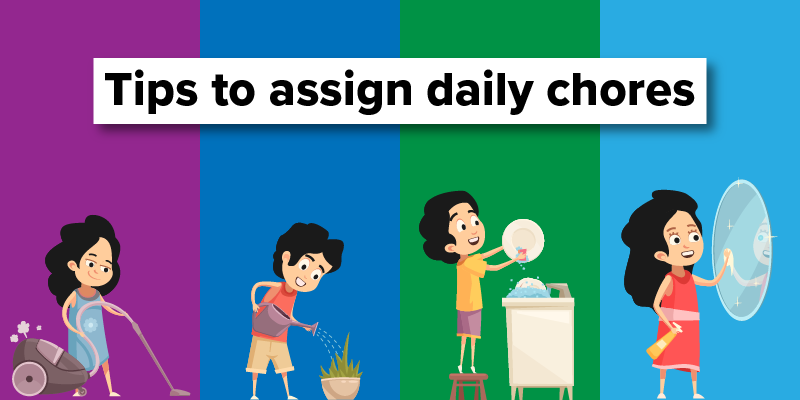
“Every child must have chores to do. It gives them dignity in work and the joy of labour.”
― Earl Hamner Jr.
Everyone needs to help around the house – be it adults or children. Household chores are never ending and everyone needs to participate in it. However, parents may not always understand how to get young children started on household chores. Today, we are going to explore how to assign daily chores to children between the ages 2 to 5.
Let’s get started!
Tips for assigning daily chores to young children
A book, Parenting Preschoolers 2 to 5 Years Old: 20 Tips for Parents from Preschool Teachers, mentions a few tips that can help parents assign chores. They are as follows:
- Start small. Parents get their child to get started on simple chores by incorporating them in their daily routine, such as putting on a cap, getting their shoes from the shoe rack before leaving the house, etc. Doing these seemingly simple tasks regularly will foster independence and boost their confidence.
- Assigns age-appropriate tasks. Parents should ensure that the tasks assigned to the child cater to the child’s age and skill level. When the child realises that the tasks are manageable, it sets the child up for success. When you can see that the child is doing these tasks with ease and competence, you can then assign them tasks that require greater dexterity and competence. You can also put the child in charge of certain tasks, such as bringing the dishes from the kitchen to the dinner table, picking up toys, or watering the plants.
- Give the child enough time to do the chores. This is an important point. Give the child a chance to perform the tasks on their own. The child may take longer to complete the tasks, but parents should refrain from doing all the thinking and planning for the child. The reason for this is to allow the child to focus on the task and learn to do the tasks independently. Parents should, however, tell the child to ask for help whenever needed.
- Assign meaningful tasks and acknowledge the effort. When the child realises that their contribution actually helps the family members, it is likely to make them feel good about doing chores. The child is also more likely to take chores more seriously when they know that the efforts are appreciated by the parents.
- Teach the child to correct their mistakes. Accidents happen. Things could go wrong when the child is performing the task by themselves. That is where parents need to explain to the child how to correct the mistake instead of fixing it themselves. Parents should take a positive approach instead of being judgemental about the accidents, which is likely to make the child defensive.
- Do not label the child. Labelling the child and calling them names is not going to make the child feel more responsible or encourage the child to do better. Parents should help the child find better ways to do better. For example: If you find that your child loses things easily, ask the child to count things before leaving a place. Support the child to do better.
Parents also need to model the desired behaviour, as children learn by observation and are likely to mimic their parents. They need to be present and guide the child through a difficult situation. It may take some children longer than others to get used to the chores. Be consistent and patient to help your child to do chores responsibly and diligently.
Do you agree with these tips? Do you have any tips that you would like to share with other parents? Let us know in the comments below.
Reference:
Parenting Preschoolers 2 to 5 Years Old: 20 Tips for Parents from Preschool Teachers. (n.d.). (n.p.): DTM Publishing, LLC.
Also read,